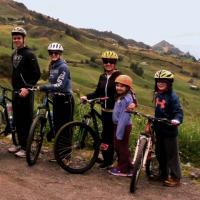The Holbrook Explorer

Plan Your Trip to Ecuador’s Otavalo Market
Plan Your Trip to Ecuador’s Otavalo Market
Vibrant colors, friendly voices haggling, rough woven textiles and the wafting scent of cooking meat. All of this is what’s in store at the Otavalo Market. Located in Imbabura Province of Ecuador, the Otavalo Market is home to the indigenous Otavaleño people, famous for weaving textiles of wool and selling them in the market, known to locals as the Plaza de los Ponchos. The market sells everything from blankets and ponchos to jewelry, instruments, leather goods, platters, spices and more. Although it is huge tourist attraction, the Otavalo Market is a must-see for anyone visiting Ecuador. However, it is important to make preparations in order to make the most out of your time at this hub of native art and culture.

Photo by Alton Biggs
How to Get There
If you are traveling independently, the most common way to get to the Otavalo Market is via bus. It is common for visitors to travel from the nearby capital, Quito, which is around a two hour bus ride. However, depending on where you are in Quito, another bus or cab ride to the bus station may be required, adding another two hours to your trip both ways. At Quito’s Carcelén bus terminal take either the Cooperativa Otavalo or the Cooperativa Los Lagos for $2.50 to get to Otavalo. Because the Otavalo Market is so vast, it may be better to find a hotel or other lodgings overnight in Otavalo, so that you can spend more time exploring the market and the surrounding city.

Photo by Dain Van Schoyck
Best Days to Visit
Saturday is known as “market day” in reference to an increase in activity (both in vendors and customers.) Although the market is open every day, Saturday and Wednesday are the two biggest days. On these two days, there will more vendors and options, but along with that comes much bigger crowds (and possibly pickpockets.) If you’re willing to sacrifice the number and variety of vendors for smaller crowds, plan to visit on another “non-market day.” The market is open from 7 a.m. until 6 p.m. Getting there early is another way to avoid crowds and get to know some of the vendors there. Again, the Plaza de los Ponchos is so large that it may take more than just one day to get through it all.

Photo by Dain Van Schoyck
How to Barter
The Otavalo Market is not like shopping in a regular store. Haggling is not only expected, but enjoyed by the vendors. It’s a part of the Otavaleño culture, and successful bartering earns respect from sellers. First of all, the U.S. dollar is the official currency of Ecuador. Bring small bills to make bartering and buying easier for you and the vendors. Another benefit of getting to the market early is scoping out all of your options before you make any final decisions to buy. When you finally decide to buy something, offer a lower price in response to the one given, but don’t go so low that it’s insulting. Be fair when haggling. If you’re not satisfied with the vendor’s price, don’t be afraid to walk away; chances are the seller will call you back with an offer of a better price. Buying multiples of the same item is another way to bring down the price—the vendors sells more than anticipated and you walk away with a great deal.

Photo by Dain Van Schoyck
What You Can Buy
Although the Plaza de los Ponchos is known for it’s textiles, it offers so much more. In addition to ponchos, clothing, blankets, tapestries and tablecloths, vendors at the market sell jewelry, fake shrunken heads, Panama hats (which actually originated in Ecuador), wooden carvings, leather goods, hand-painted platters, spices and more. In additions to the Plaza de los Ponchos, Otavalo also offers a livestock market located just outside of the center of the city near the Yana Yacu pools. Although you’re probably not interested in bringing home live animals as souvenirs from your trip, the livestock market is an exciting attraction for tourists.

Photo by Dain Van Schoyck
Spanish Phrases to Know
Although it is possible to communicate with vendors through hand gestures or simple English phrases, having a few Spanish phrases could be helpful and boost the natives’ respect for you.
- Numbers (at least 1 through 10)
- Handmade = hecho/a a mano
- Textiles
- Fabric = tela
- Leather = cuero
- Wool = lana
- Manners: pleading can go a long way when bargaining
- Please = por favor
- Thank you = gracias
- Small/medium/large = pequena/mediana/grande
- Size = talla
- How much is this? = A cuanto esta?
- Artisanal goods/craftsman = artesanias/artesano(a)
So whether you want to do some serious haggling and walk away with bundles of goods, or you just want to explore and experience a different lifestyle, the Otavalo Market offers a significant look into Ecuadorian culture.

